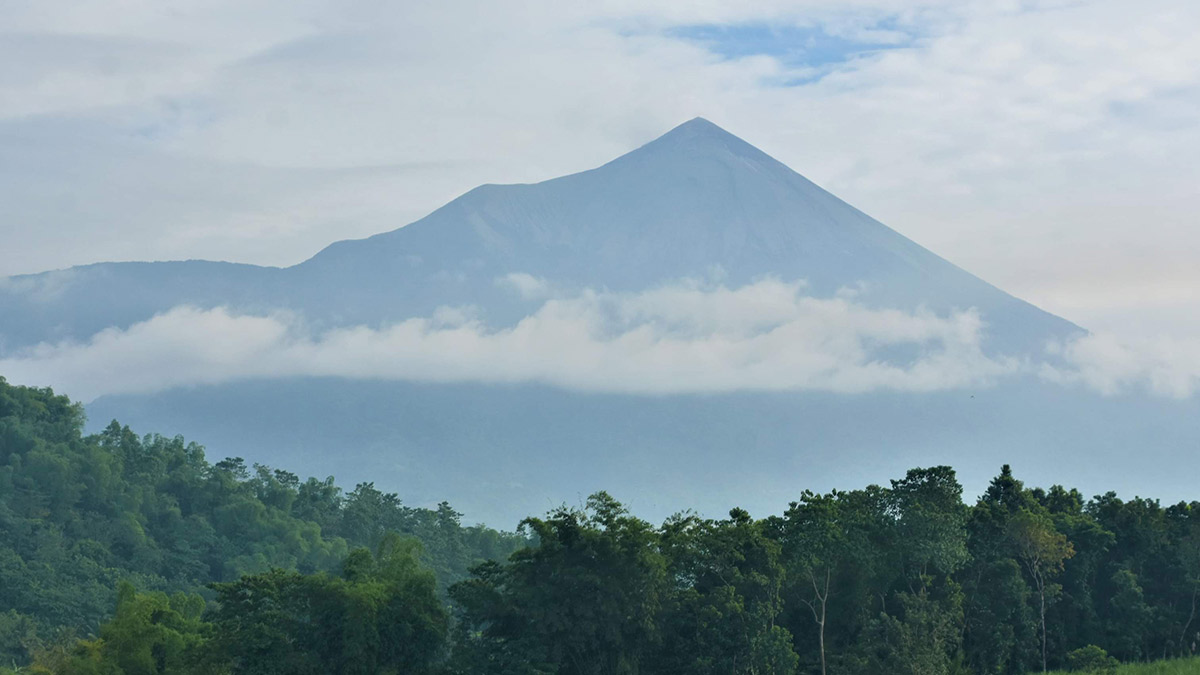Kanlaon still ‘highly dangerous’ – Phivolcs

RESTIVE Kanlaon Volcano looks calm in this aerial photo taken on Monday but it remains restive and still under alert level 2, the Philippine Institute of Volcanology and Seismology says in a briefing on Monday. —Richard Malihan/contributor
BACOLOD CITY, NEGROS OCCIDENTAL, Philippines — Even without spewing fire and ash, Mt. Kanlaon remains highly dangerous with the possibility of follow-up phreatic and magmatic eruptions.
So was the statement of Ma. Antonia Bornas, chief science research specialist of the Philippine Institute of Volcanology and Seismology (Phivolcs), in a briefing on Monday on the current restive state of Kanlaon Volcano on Negros Island that remains at alert level 2.
This means that its current unrest, driven by shallow magmatic processes, could eventually lead to explosive eruptions at the summit crater.
READ: Kanlaon Volcano update: Alert Level 2 stays
Bornas pointed out that the volcano is exhibiting “significant” eruption parameters.
Article continues after this advertisementThe volcano, she said, used to emit 300 tons of sulfur dioxide (SO2) a day but hit 4,397 tons on June 8 . The number dropped to 3,304 tons on Sunday, June 9.
Article continues after this advertisement“If monitoring parameters are sustained, phreatic and short-lived explosive eruptions may subsequently occur and produce small-magnitude hazards that will endanger areas within the 4-kilometer permanent danger zone (PDZ). Unrest is likely caused by hydrothermal processes driven by magmatic degassing deep within the volcanic edifice,” Bornas said.
Strictly off-limits
She said strict prohibition for entry into the PDZ is recommended at alert level 2.
Teresito Bacolcol, Phivolcs director, cautioned people living near the volcano not to let their guards down.
“Hope for the best, but prepare for the worst,” he said.
Mayor Rhummyla Mangilimutan of La Castellana town in Negros Occidental, one of the localities near the volcano, said their records indicated that there were 200 families with about 800 members living within the PDZ.
“Evacuations of people residing in the PDZ have already been conducted but they are still validating if it has been totally cleared,” she said.
Barangays in Negros Occidental within Kanlaon’s PDZ are Ara-al and Yubo of La Carlota City; Sag-ang, Mansalanao, Cabagnaan and Biak na Bato of La Castellana; Minoyan, Murcia; and Codcod, San Carlos City. Those in Negros Oriental are Masulog, Pula and Lumapao of Canlaon City.
Local governments, disaster officials and the general public were urged to avoid the PDZ as the chances were high of explosive eruptions similar to what happened on June 3.
Ongoing evacuation
Communities living beside river systems on the southern and western slopes of the volcano, especially those that have already experienced lahars and muddy streamflows, were advised to take precautionary measures.
Mangilimutan said they have been evacuating residents living in the path of possible lahar spills.
La Castellana had 1,314 families or 4,753 evacuees from nine barangays on Monday, she said.
Negros Occidental Gov. Eugenio Jose Lacson said the evacuees will have to stay in the evacuation centers until they are advised by the experts that it is safe to go home.
“We will make sure that we can provide the evacuees with their needs. We should not rush things and encourage evacuees to go home,” he said.
Rotten eggs
Meanwhile, the Provincial Veterinary Office was set to conduct medical missions in one barangay in Bago City and three in La Castellana to help animals that became ill following the volcano’s eruption.
The animals suffered from respiratory and gastrointestinal ailments, said Negros Occidental Provincial Veterinarian Placeda Lemana.
Mt. Kanlaon has been emitting a heavy sulfurous odor that smells similar to rotten eggs.
Phivolcs, at 9:30 p.m. on Saturday, issued a notice of elevated volcanic SO2 gas emission from the volcano based on its campaign Flyspec measurements at 4,397 tons.
“This is the highest emission this year measured by campaign survey and the second highest land-based measurement for Kanlaon,” it said.
The volcano has been degassing increased concentrations of volcanic SO2 this year at an average rate of 1,458 tons per day, but emission since the June 3 eruption has been particularly elevated at a current average of 3,347 tons a day.
Phivolcs said the ground deformation data from continuous global positioning system and electronic tilt measurements have been recording medium-term inflation of the Kanlaon edifice since March 2022 and a shorter-term inflation of the eastern flank since 2023, indicating slow pressurization within the volcano.
“The overall monitoring parameters indicate that degassing of magma may be driving current unrest, causing increased volcanic gas emission, swelling of the edifice and occasional volcanic earthquake activity,” it said.
Phivolcs also reminded communities living beside river systems on the southern and western slopes, especially those that have already experienced lahars and muddy streamflows, to take precautionary measures when heavy rainfall over the volcano has been forecast or has begun.
Heavy rains brought greyish floodwaters that caused more residents of Barangay Biak na Bato in La Castellana to evacuate on Friday night.
The thick mudflow is believed to contain ash and debris from Mt. Kanlaon and flowed down to the lower sections of the volcano.